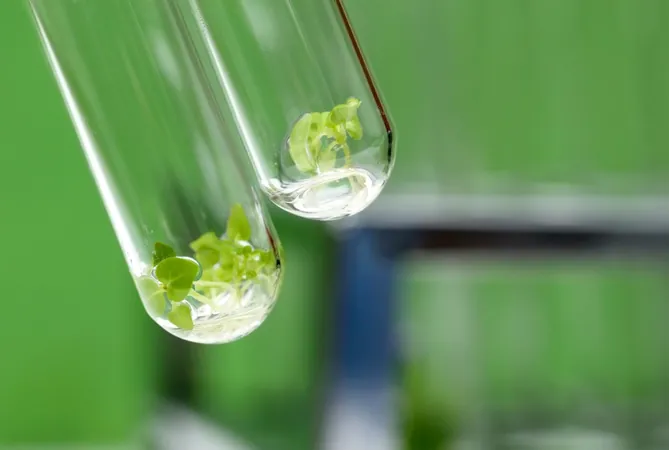
Pioneering Discovery Utilizes Trees to Replace Petroleum-Based Chemicals!
2024-10-27
Author: Li
Groundbreaking Advancement in Industrial Chemistry
In a groundbreaking advancement, scientists at North Carolina State University (NCSU) have unlocked the potential of trees as sustainable sources of industrial chemicals. This innovative research centers on altering lignin—a fundamental polymer found in trees—through cutting-edge CRISPR technology, heralding a significant step toward reducing reliance on petroleum-derived substances and contributing to environmental conservation.
The Role of Lignin in Trees
Lignin plays a vital role in a tree's structure and strength, but it also presents a formidable challenge for its breakdown in industrial applications. This compound inhibits microbial fermentation, a crucial step needed for transforming plant matter into valuable chemicals. After years of dedicated research and collaboration, the NCSU team, led by notable scientists Robert Kelly and Jack Wang, has identified key components in lignin that affect its breakdown efficiency.
Innovative Approaches to Lignin Modification
Kelly, who directs the Biotechnology Program at NCSU, has been investigating the use of heat-loving bacteria from natural hot springs to decompose tree cellulose. However, early experiments yielded unsatisfactory results for economic viability. Recognizing that merely reducing lignin wasn't sufficient, Wang, who oversees the Forest Biotechnology Program, took an innovative approach by using CRISPR to modify lignin in fast-growing poplar trees, making them prime candidates for industrial chemical production.
Enhancing Chemical Processing Efficiency
The researchers discovered that poplar trees engineered to have lower lignin and methoxy content significantly enhance the efficiency of chemical processing by bacteria. In laboratory settings, these modifications revealed that genetically altered trees were substantially easier to ferment, setting a new standard in sustainable manufacturing.
Refinement Through CRISPR Technology
The use of CRISPR allows Wang and his team to refine the lignin properties of poplar trees, which are advantageous due to their rapid growth rates and low pesticide requirements. Kelly's group found that certain thermophilic bacteria excel at degrading these specially modified trees, providing a streamlined solution for industrial applications. However, the variance in performance among CRISPR-modified trees underscored the necessity of managing methoxy content effectively.
Leveraging Diverse Bacterial Capabilities
Ryan Bing, a former student of Kelly's, emphasized the diverse capabilities of different bacteria in breaking down plant material. Lower methoxy levels in lignin were identified as a critical factor that makes cellulose more accessible for fermentation, paving the way for environmentally friendly and economically viable processes.
The Future of Industrial Chemical Production
This transformative discovery promises to revolutionize the production of industrial chemicals. Scientists are now focusing on optimizing the design of trees with decreased lignin and methoxy contents, with promising results observed in controlled greenhouse settings and ongoing field tests aimed at evaluating performance in natural environments.
Advantages of Utilizing Thermophilic Bacteria
Additionally, utilizing thermophilic bacteria offers remarkable advantages. These microorganisms can streamline both the degradation and fermentation phases, eliminating the need for extensive pre-treatment processes and reducing the overall energy requirements. The ability of high-temperature bacteria to function without sterile conditions further minimizes operational costs and complexity.
Potential Impact on Fossil Fuel Dependence
Should the field trials of these engineered trees prove successful, coupled with ongoing advancements in microbial fermentation techniques, we may witness a dramatic transformation in industrial chemical production methods. With optimism, Kelly and his team believe this pioneering research could lead to a substantial decrease in society's dependence on fossil fuels, paving the way for a greener future.
A Call for Sustainable Practices
This revolutionary breakthrough reflects the urgent need for sustainable practices in industrial sectors, as society increasingly grapples with climate change and depletion of fossil resources. The potential implications of this research stretch far beyond the laboratory, promising a cleaner, more sustainable industrial landscape.

 Brasil (PT)
Brasil (PT)
 Canada (EN)
Canada (EN)
 Chile (ES)
Chile (ES)
 España (ES)
España (ES)
 France (FR)
France (FR)
 Hong Kong (EN)
Hong Kong (EN)
 Italia (IT)
Italia (IT)
 日本 (JA)
日本 (JA)
 Magyarország (HU)
Magyarország (HU)
 Norge (NO)
Norge (NO)
 Polska (PL)
Polska (PL)
 Schweiz (DE)
Schweiz (DE)
 Singapore (EN)
Singapore (EN)
 Sverige (SV)
Sverige (SV)
 Suomi (FI)
Suomi (FI)
 Türkiye (TR)
Türkiye (TR)